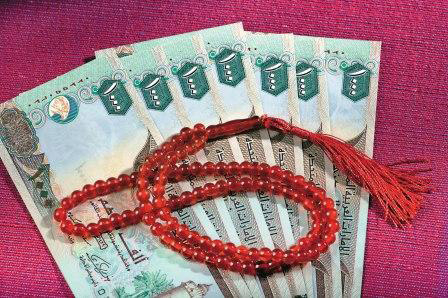
Mohammad A. is planning a wedding. He wants to impress his bride with a luxurious setting in a Dubai hotel and invite as many relatives as possible. After the ceremony, he plans to head off with his wife on a two-week honeymoon at a nice beach resort in Malaysia.
The problem: his savings are not sufficient to cover all expenses. This is why he approaches a bank for a wedding loan, preferably an Islamic banking product.
He discovers that Sharia-compliant wedding loans are not unusual and a number of Islamic banks are offering these, as well as student, travel and health care loans or small business financing. Actually, Islamic personal lending requires collaterals, be it a home, car, furniture or services. In Mohammad’s case – provided he fulfils requirements such as regular income and minimum salary — the bank would provide the loan and buy the wedding and travel services he needs directly from the provider and resell them to him at an agreed profit rate, which is the common variant and normally comes with takaful-based loan insurance.
Collateral commodities
However, there are cases when someone applies for an unsecured loan. For example, Ahmed M. needs a loan to settle some debts as well as school fees for his son and there is no real collateral he can present. What the bank does is that it links the loan to a commodity transaction on the principle of murabaha — a common way to provide unsecured Sharia-compliant loans. The bank acts as an agent for the customer and sells a commodity it has in the books, such as metals or others — for example, Dubai Islamic Bank’s preferred personal loan commodity is sugar — to a third-party broker and remits the cash to the customer’s account, which is actually the latter’s loan. The client then pays the price for the commodity back to the bank in deferred instalments, with a profit rate.
“The purchase and sale of the commodity takes place on the same day to avoid price risks,” says Nathalie Schoon, Islamic finance expert, former Head of Product Development at the Bank of London and The Middle East and accredited Islamic finance trainer. “The end result is that the client has an amount of money in his account that needs to be paid back at an agreed markup.”
In the case of asset-backed personal loans for a car, new furniture or other such tangible goods, the loan works either on the basis of a lease, hire-purchase contract or via deferred payment contracts. In the first case, when the customer applies for the loan, the bank buys the goods on the customer’s behalf and resells to them through repayment instalments plus a rental fee until the debt is paid off. In the second case, the bank buys the goods and resells them to the client at a profit, also in instalments.
Special forms of personal loan that are more common in Islamic finance than in conventional banking are loans for stock trading. The bank buys shares in Sharia-compliant listed companies and resells them to the client at a profit. The client can then trade in stocks in the way they want. For example, Abu Dhabi Islamic Bank offers personal finance for shares bought from the bank at repayment periods of up to four years “at attractive rates”.
Alternative model
Many see Sharia-compliant personal finance as a responsible solution for global financial markets. Given the impact of bad loans on the financial system in the West, which led to a global crisis, some experts are emphasising the superiority of the risk-sharing model over interest-based banking.
“Could Islamic bankers tailor an innovative and responsible model that drags consumer lending markets worldwide to healthier competition and a win-win partnership for all concerned parties? Yes we can,” says Ehmad El Sahhar, Head of Islamic Banking Sector at Egypt-based Banque Misr.








